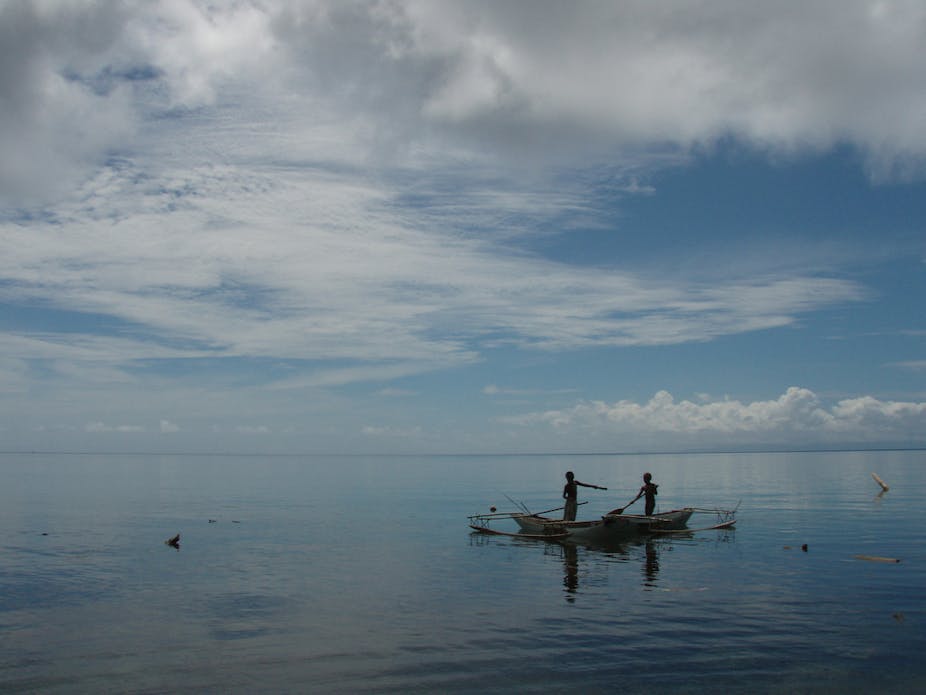Overfishing is a serious problem on many of the world’s coral reefs – a problem that is generally attributed to too many people. But our research has found that economic development, rather than population, is the main driver of overfishing on coral reefs in the western Indian Ocean.
Interestingly, the heaviest overfishing on coral reefs occurs in countries part way up the development ladder. Countries with either very low or high levels of development tend to have reef fisheries in pretty good shape – about four times the reef fish biomass of the intermediate development sites.
Maybe the easiest way to explain our results is for you to imagine a valley, with steep mountains on either side.

On top of the mountain at one side of the valley are the least developed places such as Madagascar. Here, fishing technology is pretty basic, which means it is harder to plunder the reefs.
Village traditions also limit fishing. For example, in parts of Madagascar there are taboos on the days people can fish, the types of fish they can eat, the gear they use, and even sacred areas where nobody is allowed to fish.
I’ve studied these types of taboos from Papua New Guinea across the Indian Ocean to Madagascar. Where they operate there is 25-300% higher fish biomass. In some places the coral cover is twice as high, too.
However, these systems only seem to operate in areas with low levels of development, low populations (in Papua New Guinea the threshold seems to be about 1,000 people), and far from markets (about 16 kilometres).
On the mountain on the other side of the valley are countries such as Seychelles. They have a higher economic diversity and a lower reliance on reef fish for food or profit.
Here scientific and management institutions help to effectively govern reef fisheries, which are in relatively good condition.

Now if you take a few steps from either mountain, you’ll quickly find yourself sliding down the slopes to the bottom of the valley.
Here, societies are moderately developed, which means they have the technology to plunder their reefs, but don’t have the institutions to effectively manage them. The traditional systems have broken down, but national governments are often too inadequately resourced to effectively manage fisheries without the full support of local communities.
In this valley of depletion, the amount of fish is only about a quarter of the more-or-less developed places.
Because of declining catches, many fishermen here have to fish harder and harder just to survive and some are caught in a “poverty trap”. This occurs when that short-term need to survive outweighs any long-term advantages to conservation or sustainable management.
In this situation, some fishers resort to using highly destructive gear such as seine nets or explosives to make ends meet. This, of course, damages the fishery further and can lead to a cycle of poverty and reef destruction.

The real danger here is that if plundered too hard, these coral reefs may lose their resilience and not come back when and if economic conditions improve.
So there is both a good and bad side to the story.
The bad news is that the valley of depletion is very wide and sliding into it is much easier than climbing out.
Whether the world has coral reefs in the future will not only depend on whether we tackle climate change challenges such as ocean acidification and coral bleaching. It will also largely depend on whether developing countries can navigate the transition from deep poverty to prosperity without ruining their fisheries.
For societies already in a poverty trap, governments and donors need to get them out and couple this development with good governance and strong institutions.
The good news is that the path to reef destruction is not inevitable. Coral reefs can be sustained with the right combination of approaches, which includes fishery closures, property rights, and gear restrictions while at the same time tackling poverty as a root cause of reef decline.
This article was originally published in People & The Environment.

